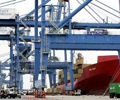Flush with cash, ONE swaps charters for own container ships

After years of relying on charters, container ship operator Ocean Network Express is tapping profits from the COVID-19 era to build its own greener, more competitive fleet.
“We don’t own any ships ourselves on our balance sheet, but it is our intention to start owning ships,” ONE CEO Jeremy Nixon told Nikkei. ONE currently charters 80% or so of the vessels it uses on long-term contracts, and the rest on short-term contracts.
Singapore-based ONE was founded in 2017 as a joint venture of Japanese shippers Nippon Yusen, Mitsui O.S.K. Lines and Kawasaki Kisen. Nixon, a former executive at Nippon Yusen, has led ONE since.
ONE is the world’s seventh-largest container ship liner operator by capacity, with a market share of around 6%, according to French data provider Alphaliner. It is a major player in the Asia-Pacific, conducting more than 40% of its regular shipments within the region and more than 10% between Asia and North America. Its competitors include China’s COSCO Group and Taiwan’s Evergreen Line.
ONE sees owning its own vessels as key to further growth. It announced Wednesday that it had ordered 10 large new container ships for delivery in 2025 and 2026. The vessels, which could eventually run on alternative fuels like methanol or ammonia, are expected to cost 100 billion to 200 billion yen ($760 million to $1.5 billion).
ONE is expected to take ownership of these 10 new vessels, along with 10 ships ordered in May 2022.
The shipping company plans to invest at least $20 billion by fiscal 2030, with the majority going toward ships and related expenses. It considers decarbonization a top priority and aims to procure environmentally friendly vessels.
ONE is also looking to bolster its access to charters.
The company is part of a consortium slated to complete the acquisition of Atlas, the parent of world-leading container ship lessor Seaspan, in the first half of 2023. Consortium members already own more than two-thirds of Atlas and are expected to put in an additional $1.6 billion for the deal.
ONE is Seaspan’s largest client. It hopes that the acquisition will give it more options and flexibility in future contracts.
Strong profits under COVID-19 underlie ONE’s bold investment drive. Shipping rates surged during the pandemic over demand from consumers stuck at home, as well as supply chain disruptions, resulting in a $16.7 billion net profit for the year ended March 2022.
ONE is on track for a $14.7 billion profit this fiscal year as well. It held 1.9 trillion yen in cash and deposits at the end of March 2022, compared with 240 billion yen two years prior. Net assets account for over 60% of the company’s total assets.
There are multiple advantages to owning container ships in-house. Companies are less exposed to volatility in charter rates. They can order and own greener vessels to help meet decarbonization goals.
ONE also no longer expects to be able to rely on Nippon Yusen, Mitsui O.S.K. Lines and Kawasaki Kisen for charters. “We can no longer rely on our shareholder to charter to us,” Nixon said.
“In the future, they [the three parent companies] will not buy any ships for us, and they will not charter any additional ships,” he said.
But owning a fleet comes with drawbacks as well. Placing container ships on balance sheets would expand ONE’s total assets, impacting its capital efficiency. The company could be forced to log impairment losses under headwinds.
The market’s uncertain future is also a concern. Huge orders for container ships placed during the pandemic boom are expected to be fulfilled and enter the market after this year, which could result in supply outstripping demand — potentially leading to a decline in freight rates.
The tailwinds that continued through the fiscal year ending this March will weaken with the next one, and declining sales and profits are inevitable. The coming year of mounting headwinds will be a test for ONE, which began service in 2018 and aims to become one of the industry’s most profitable companies.
Source: Nikkei

 Hellenic Shipping News Worldwide Hellenic Shipping News Worldwide, Online Daily Newspaper on Hellenic and International Shipping
Hellenic Shipping News Worldwide Hellenic Shipping News Worldwide, Online Daily Newspaper on Hellenic and International Shipping





















 PG-Software
PG-Software